
Delivering the future of OB, today
For more than 15 years, Ob Hospitalist Group (OBHG) has focused on ensuring women receive the timely, unconditional obstetric care they deserve with the best outcomes possible. The company was founded in 2006 with the vision and commitment that every expectant mother presenting to labor and delivery would receive consistent, unconditional, quality medical care from an experienced clinician.
Our team partners with hospitals across the nation to improve maternal safety and outcomes and reduce physician burnout. Throughout the years we’ve grown to become the nation’s largest and only dedicated OB hospitalist provider with more than 200 hospital partners and 1,000+ clinicians passionate about their role in caring for pregnant women.
OBHG’s journey over the past 15 years has been incredible. As we look towards the future – and the next 15 years – we look forward to our role in continuing to shape the future of maternal health care.


1 Letter from our Chief Executive Officer, Lenny Castiglione 2 Letter from our Chief Medical Officer, Dr. Mark Simon 3 2021 by the numbers .............................................................................................. 4-5 Reflections on the past & an eye to the future ..................................................... 6-8 OBHG hospital partner spotlight .............................................................................. 9 Addressing future trends in obstetrics 10-11 Growing to support maternal health 12-15 What our hospital partners are saying ...............................................................16-17 OBHG clinicians deliver the future of OB ......................................................... 18-21 Supporting our hospital partners ..................................................................... 22-23 OBHG in the news 24-25
2021 marked a very special year for Ob Hospitalist Group as we celebrated our 15th anniversary. When I reflect on the last fifteen years, I see an organization that has not only grown to more than 200 hospital partnerships across the United States, but an evolving organization that’s adapted its model to be flexible and customizable while remaining steadfast in driving better outcomes and patient care.
The breadth of impact of OBHG’s clinicians can be seen in three other significant milestones from 2021. Since our founding fifteen years ago, OBHG clinicians have had 3,000,000 patient encounters, 1,000,000 high-risk encounters, and 250,000 deliveries. These milestones reflect the many lives OBHG clinicians have positively impacted over the last fifteen years. Our clinicians’ strong and continued dedication to the expectant mothers they care for is inspiring. I hear stories every day that demonstrate how our teams lower the risk of serious harm and improve outcomes for women and babies.
Throughout OBHG’s journey, our commitment to ensuring women receive timely, unconditional obstetric care has only strengthened. Even as we’ve become a nationally recognized industry leader, we continue to push ourselves to do more for pregnant women and their babies. As I look ahead, I am excited about the new solutions we are bringing to hospitals and patients, and our continued focus on improving access to care and impacting maternal health outcomes.
Each year, Progress Notes serves as a checkpoint for our journey. Did we meet our goals in expanding access to care for women? 2021 continued to bring unexpected challenges to individuals, families and businesses – and of course, healthcare. Throughout the year, we continued to help our hospital partners navigate the challenges of the COVID-19 pandemic. I am proud of how the entire OBHG team took innovative approaches to every challenge to help our hospital partners and patients.
I hope that you will enjoy reading about our accomplishments from the past year, a look back at our history and our vision for the years ahead.
Sincerely, Lenny Castiglione Chief Executive Officer

2
Fifteen years is a great milestone. The idea of OB hospitalists has provided new life to the OB/GYN specialty as we offer quality and safe care to our female patients and their offspring while improving the services to our hospital partners.
– Dr. Lydia Sims, OBHG clinician
Our 15th anniversary Progress Notes celebrates OBHG’s beginning and looks towards the future. Our founder, Dr. Chris Swain, was guided by a passion for women’s healthcare. Recognizing flaws in the traditional way that pregnant women received care in the hospital setting, Dr. Swain created the nation’s first 24/7 obstetric emergency department (OBED). Thanks to Dr. Swain, the OBED has evolved into the standard of care, with hospitals across the U.S. adopting OB hospitalist programs, many with the original OBED architecture.
When OBHG was established 15 years ago, OB hospitalists primarily provided care to pregnant patients presenting with unscheduled needs as well as patients without a physician. They also partnered with private practice OB/GYNs as an extension of their team.
With growing pressures on hospitals to address maternal mortality and implement standard labor and delivery protocols, today’s OB hospitalist role is expanding. Our research reveals that today’s most successful OB hospitalists are serving as change agents to improve care and outcomes by focusing on hospital culture, team communication and safety standards. Not only are OB hospitalists providing 24/7 care and partnering with community physicians, but they are also evolving to become maternal safety champions of the entire labor and delivery unit.
Today’s nursing and physician shortages make it even more essential that today’s OB hospitalists are successful leaders in supporting hospitals and local providers in ensuring pregnant women receive the care they deserve, with the best outcomes possible. Equipping our clinicians with the tools they need to be successful maternal safety champions is one of OBHG’s top priorities.
I am confident that we will continue to see new challenges and opportunities in the next 15 years, and I look forward to the journey of continuing to create a brighter future for women and their families.
Sincerely, Mark N. Simon, MD Chief Medical Officer

As site director, I have the unique opportunity to focus on one main issue: improving patient safety for pregnant and postpartum patients. I feel I can best achieve this by networking with other leaders in nursing, risk management, education, pediatrics, the emergency department etc. to continually work on quality improvement. As a leader I have worked hard to present our team as a 24/7 resource for the entire hospital and have developed relationships that lead to ready communication and a collaborative atmosphere.
–OBHG Site Director, Providence St. Joseph Site Director
3
4 33 States with programs 570,295 Patient encounters 49,524 Deliveries 194,788 High-risk encounters 64,907 Emergent interventions 30,762 Cesarean assists PROGRAM STATES 2021 by the numbers
Hospital
partners
5
partners 214 Hospital system
87 Customer retention 94% Net promoter score 82 Support team employees 252 Diverse group of 1,176 clinical employees 63% Female 36% Racial and ethnic minorities
Reflections on the past & an eye to the future
A company is born
OBHG’s story began in 2006 – 15 years ago. At the beginning of his obstetrics career, OBHG’s founder, Dr. Chris Swain was surprised to learn that many expectant mothers, concerned that something might be wrong, did not see a physician when they visited a hospital emergency room. Instead, they were transferred to the labor and delivery department and evaluated by a nurse taking instructions over the phone from a physician. If the patient and her baby were in serious distress, it became a waiting game, with the risk escalating every minute she waited for medical attention from her doctor — or any doctor.
Realizing the seriousness of delays in care, Dr. Swain’s vision was a 24/7 obstetric emergency department (OBED), based on the internal medicine hospitalist model. With an OBED, any patient presenting with an emergency condition at any stage in pregnancy, including the postpartum period, would be seen by a physician or midwife alongside the obstetrical nurse. Emergent issues would be quickly addressed by an OB/GYN with specialized training in those situations. Importantly, those clinicians would be solely dedicated to practicing at a hospital, lessening the burdens on community OBs and supporting their private practices.
Dr. Chris Swain, OBHG founder & original innovator of the obstetric emergency department
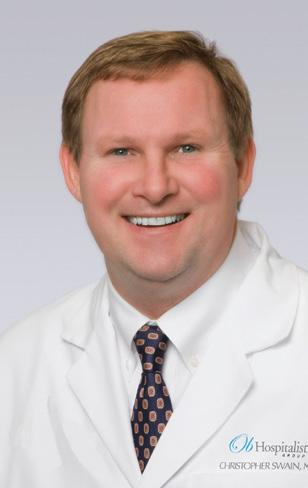
For patients already under the care of an assigned obstetrician, the OB hospitalist would stabilize the patient and then coordinate continuing care with her primary obstetrical clinician. For patients without a primary obstetrician, the OB hospitalist would care for the patient from arrival through discharge.
“What’s important about the OBED concept is that it created possibilities for hospitals to establish OB hospitalist programs,” said Dr. Swain. “Not only did it solve many problems that hospitals were having, but it also saved the life of patients and was transformative for the lifestyle of OB/GYNs to have the ability to practice differently with less burnout.”
After a pilot program of the first OB hospitalist program and OBED were launched by Dr. Swain in Florida, hospitals across the country soon began to express interest.
“�In the first half of pregnancy a patient would go to the ER and see a doctor. After the doctor rendered care, the patient was either sent home or admitted. But in the second half of pregnancy, patients would bypass the ER and be sent straight up to labor and delivery and see a nurse. I really struggled with this. One night I woke up with the idea of creating an OBED. Not only would it be a way for patients to receive a higher level of care, but it would also provide all-hours support for overworked local obstetricians.”
“The introduction of OB hospitalists has been a major step forward for Houston Methodist Childbirth Center at Sugar Land because it ensures that every woman has access to an OB/GYN, even when their own physician is delayed getting to the hospital. Working with the OBHG physicians has strengthened our ability to provide specialized care around the clock, improve patient safety and enhance our coordination of care, especially for women in emergency situations or those with high-risk pregnancies in Fort Bend County and surrounding areas.”
6
— Dr. Chris Swain, MD, OBHG founder and inventor of the OBED
— Dr. Christina Martin, Director of Perinatal Services, Houston Methodist Sugar Land Hospital
Milestone achievements
OBHG’s 15th anniversary wasn’t the only significant milestone that occurred last year. We proudly celebrated the following clinical milestones in 2021:
encounters
*Since OBHG’s inception
These milestones, along with OBHG’s achievements throughout the years, further help characterize OBHG’s journey over the past 15 years.
Milestone focus: 3,000,000th patient encounter
In July 2021, Dr. Jill Palko, OBHG hospitalist at Health Park Medical Center in Fort Myers, FL, served as the attending clinician for OBHG’s 3,000,000th patient encounter. Dr. Palko, who joined OBHG three years ago, was pleasantly surprised to learn she was associated with such a significant milestone.
“I am so honored to be part of this special event in OBHG’s history,” said Dr. Palko. “Being an OB hospitalist just fits my personality. Every day is something new and different. I am in a better mindset due to having improved work/life balance as an OB hospitalist, and I know this helps increase the quality of interactions I have with patients. Because of my increased personal and career satisfaction, I have been able to forge more meaningful working relationships with the other OB/GYNs physicians I work with, my OBHG teammates and the nurses. There is an almost indescribable sense of pride I feel when I am there to take care of a patient during an emergent situation, and we have a good outcome. I truly feel like my presence at the hospital is making a difference - something I did not feel in private practice.”

Encounter
7
3,000,000 | Patient encounters* 1,000,000 | High-risk
* 250,000 | Deliveries*
3,000,000th Patient
1,000,000th High-Risk Encounter
Milestone focus: 1,000,000th high-risk encounter
Dr. Sarah Nelson, OBHG site director at Houston Methodist Sugar Land Hospital performed OBHG’s 1,000,000th highrisk encounter. “When working with high-risk patients, you not only have to see the small details, but you also need to take a step back and look at the big picture,” said Dr. Nelson. “You need to be able to see the patient’s case as a whole to understand, identify and diagnose the problem. I feel fortunate to have the opportunity to care for high-risk patients, which is why this milestone is so significant to me.”
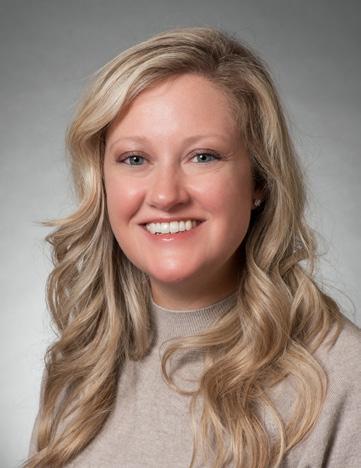
Dr. Nelson says she enjoys the hospital’s supportive and encouraging atmosphere. “We are very supported by the hospital administration, and they make our job easier. Being an OB hospitalist has been really good for me personally and professionally. When I was in private practice, working in the hospital was the most fulfilling part of my job. Now as an OB hospitalist, I thrive in the challenges of the hospital and don’t have to worry about what’s going on in the office five days a week.”
Milestone focus: 250,000th delivery
OBHG’s Dr. Rebecca Cisneros performed OBHG’s 250,000th delivery at Mercy Hospital Fort Smith in Arkansas in late July 2021. Dr. Cisneros joined OBHG the year she graduated from residency. “I really love the flexibility I have as an OB hospitalist,” said Cisneros. “When I’m on, I’m on, and when I’m off I’m off – I don’t have the extra duties all my colleagues in private practice do. I work full-time for OBHG, which equates to seven or so shifts a month.”
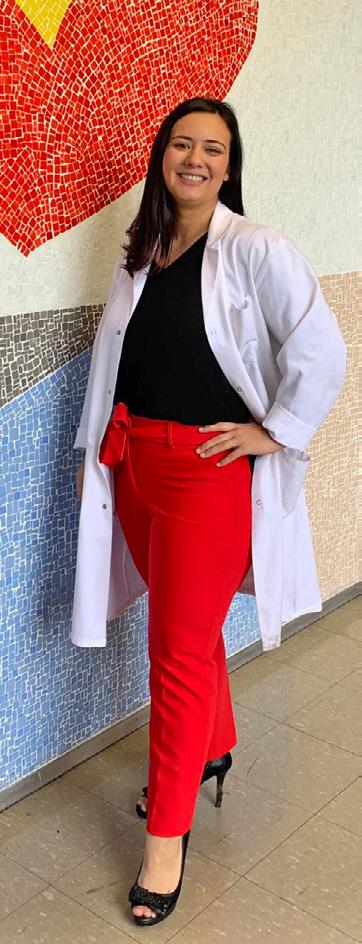
As someone who enjoys traveling and camping, the OB hospitalist lifestyle really suits Dr. Cisneros. “We love to travel in our RV and visit family in different states. I really missed out on seeing family and traveling during residency but now I have flexibility in my schedule to travel again.”
Dr. Cisneros recommends OB hospitalist work to anyone completing residency. “I tell my colleagues that are coming out of residency to look at OBHG. Whether they want full-time work or maybe need to supplement their income during a fellowship, OBHG is a great option. The work is very rewarding, and the schedule is flexible.”
8
250,000th Delivery
OBHG hospital partner spotlight
Carroll Hospital, Westminster, Maryland
The leadership of Carroll Hospital partnered with OBHG in 2018 to implement a full-time triage program in November of that year. We asked Dr. Mark Olszyk, Chief Medical Officer and Vice President of Carroll Hospital, about the evolution of the hospital’s labor and delivery department to a comprehensive in-house coverage model in partnership with OBHG.

Clearing the clutter
Dr. Olszyk explained what his labor and delivery department looked like before this change: “If I had to pick one word, it would be Byzantine.” With a hospital and an associated multi-specialty care group, OB/GYNs and midwives rotated call covering their own patients plus triaging for community practices and any unaffiliated, unassigned patients.
At one point, the department had three parallel call schedules, which led to a lot of confusion. Dr. Olszyk was forced to become the scheduler of last resort, frequently negotiating last-minute coverage. The overly complicated nature of this arrangement ran the risk of inadequate coverage and physician burnout. It was clearly untenable.
“We did a couple of different proformas and looked at different models. If we did it entirely ourselves—compared to just contracting out to a company such as OBHG—we could save a little bit of money,” said Dr. Olszyk. “But that doesn’t account for all of the realities, all of the risks, all of the tears on the part of the administrative staff and the leadership, trying to ensure that the call schedule is filled up and the patients are taken care of.”
A change for the better
As Dr. Olszyk puts it, partnering with OBHG was an “elegant solution.” “I’m no longer the scheduler. I’m no longer the recruiter. If there’s ever an opening, they do all the recruiting, the initial credentialing. They monitor them. They take care of all the HR. We have the luxury of setting the performance metrics, and they cascade it down. And they give us very nice, high-production value monthly reports.”
“It’s just gotten better and better,” Dr. Olszyk continues. “The trust has continued to deepen; the relationships have broadened. I think the patients are much happier. They’re certainly well taken care of. The nurses are very happy as well. So, it’s really enhanced the department cohesion. There are fewer issues to address.”
Dr. Olszyk also appreciates OBHG’s stellar reputation and accountability in every aspect. “It’s really been a wonderful relationship and I’ve enjoyed getting to know all of the physicians, as well as their leadership over the last two years.”
9
Maybe it seems a little cheaper, but that doesn’t account for all of the realities, all of the risks, all the sweat and tears of the administrative staff and leadership trying to ensure the call schedule is filled up and the patients are taken care of.
— Dr. Mark Olszyk, Chief Medical Officer and Vice President, Carroll Hospital
Dr. Mark Olszyk
Addressing future trends in obstetrics
Hundreds of women in the U.S. continue to die each year in pregnancy or within the first days or even months after delivery. To make matters worse, recently released CDC data indicates that the maternal mortality rate in the U.S. has increased by 14% from 2019 to 2020, signifying that the consequences of the COVID-19 crisis have been dire for maternal health, particularly for women of color. Despite these extreme statistics, experts say that more than 60% of pregnancy-related deaths are preventable.
Another challenge is access to care. According to the March of Dimes, more than 4.8 million women of childbearing age in the U.S. live in counties with limited access to maternity care. Without access to convenient, quality maternal care, women are at risk of serious health complications and face a greater chance of preterm birth and obstetrical complications.
To counter these trends, the U.S. must redefine how we address the causes of maternal mortality through upgrades to women’s health before, during and after pregnancy. More must also be done to bring care to communities so that women don’t have to travel great distances for maternal care. As a national leader in customized women’s health solutions, OBHG has a responsibility to help shape the future of women’s healthcare. Read below for just some of the many ways OBHG is advancing future trends in obstetrics.
Bolstering the longevity of communities
With more rural counties losing obstetrics care and facing staffing challenges, OBHG recently announced a new effort to bring alternative options to communities and hospitals with maternity care challenges.


OBHG’s Maternal Health Access Solutions, a suite of services that bridges gaps in care in communities to expand health services, bolsters maternity care access, supports community providers and improves patient outcomes. Drawn from OBHG’s experience and success working with more than 200 hospital partners of all sizes, these solutions are distinct from OBHG’s core OB hospitalist model and includes community OB/GYN clinic staffing, coverage by Certified Nurse Midwives, family practitioners, or other clinicians and telemedicine options. This evolution in care delivery is part of our core mission to elevate care and improve outcomes for pregnant women.
Utilizing data to transform the industry
Learning through data is a powerful resource in advancing maternal outcomes. At OBHG, not only do we track NQF and CMS core quality metrics, but we also maintain quality and risk data on our OB hospitalists. Our data set, the largest collection of OB hospitalist data in the industry, is used by our teams to track trends and identify quality improvement opportunities.
Evidence-based practices have always been the foundation of our work with our hospital partners. Our clinicians submit clinical information into our national databases, which captures data used to track quality and outcome metrics. They then draw on this network of evidence-based best practices to improve outcomes at the local level.
To further the public good in addressing future trends in obstetrics, we recently deepened our emphasis on further innovating OBHG’s risk management tools and data. While using our data and tools to improve national maternal care outcomes has always been an OBHG priority, we are committing new resources and processes to a renewed focus on improving maternal health knowledge. We look forward to sharing more details about our continued advancement in improving the lives of pregnant women.
10
Future of Obstetrics: Industry Survey Report

As the largest employer of OB/GYNs in the U.S., OBHG keeps pulse on the evolution of the industry to help drive positive change in elevating the standard of care for all women. This includes helping to address the major concerns OB clinicians observe while working in labor and delivery units across the country. Last year, we undertook a major survey to provide insight into perceptions, trends and shifting priorities among OB/GYN physicians nationwide.
Our report, “Future of Obstetrics: Industry Survey Report,” revealed that a majority of the 1,130 obstetrics clinicians surveyed in communities across the U.S. cited patient care, physician support and staffing as top concerns in 2021. Other key findings
• Younger OB/GYNs are looking for more stability and work-life balance through employed vs. independent practices, and many of them do not have a choice in where their patients deliver.
• When OB/GYNs have a choice in where they send their patients, high-risk support and on-site coverage are the two primary factors in their decision-making.
• While the models and services vary, 24/7 in-house coverage models – through OB hospitalist models or residency programs – are growing in prevalence, particularly the outsourced OB hospitalist model.
• Nursing shortages and education on labor and delivery are major concerns for physicians when it comes to patient safety.
• Resources and support are top reasons why obstetricians deliver at their current hospital
• OB/GYNs are concerned about the national trends in maternal mortalities
• Telemedicine is expanding rapidly and permanently
Overall, the survey revealed some startling gaps in physician and patient support all along the care continuum in obstetrics and OB hospitalist programs filling them. The findings highlight considerations for additional measures that can be taken to support optimal patient health outcomes. We shared the report results with hospital leaders and OB/GYNs across the country to further their understanding of the current state of obstetrics, from the perspective of our nation’s OB/GYNs.
Maternal safety champions
OB Hospitalist
Not only do OBHG hospitalists provide great care and better outcomes for their own patients, but they also make a significant impact in the quality of care and outcomes for all patients across the unit.
Throughout the years, we’ve seen the role of the OB hospitalist expand. Labor and delivery is not a closed unit where one group sees all of the patients, therefore OBHG clinicians must use leadership and communication skills to impact care for all patients. At OBHG, we realize that our clinicians are uniquely positioned to recommend and implement proactive strategies not just for our own hospitalist teams, but in collaboration with hospital leadership and the entire organization’s labor and delivery clinicians (including community OBs, nurses, CNMs, MFM specialists, surgeons, anesthesiologists and others).
Hospitals that partner with OB hospitalists as the “maternal safety champions” of the entire labor and delivery unit are reaping the greatest advantages of team-based care, including happier clinicians, improved quality and positive impacts to the patient experience. We see this evolution in OB hospitalist medicine as the future of impacting positive change across the entire labor and delivery unit.
11
Adoption 84.8%West 81%Southeast 81%Southwest 81.7 % Northeast 70.5%Midwest
Growing to support maternal health
Fifteen years after the first OBHG partnership launched in Florida, we’ve expanded our partner base, footprint, service offerings and relationships across the healthcare community. Over the next fifteen years, we expect this growth to continue to accelerate as OB hospitalist medicine has become the standard of care for addressing maternal mortality, disparities in care and access to care and the national shortage of OB/GYNs and nurses.
Delivering Excellence Across the Network
Last year OBHG extended its track record of world class customer satisfaction with 94% customer retention and with a Net Promoter Score (NPS) of 82. Furthermore, we expanded our coverage and support at 11% of our partner facilities – representing increased delivery volume for our hospital partners and engagement of OBHG’s clinical team. We are particularly proud of these results in a year where faceto-face relationship building with our customer was rare, and customer needs and expectations were at an all-time high. This strong performance is testament to the dedication of our dyad leadership from our clinical and business operations teams and the support of our matrix teams across the organization.
New OB hospitalist partnerships
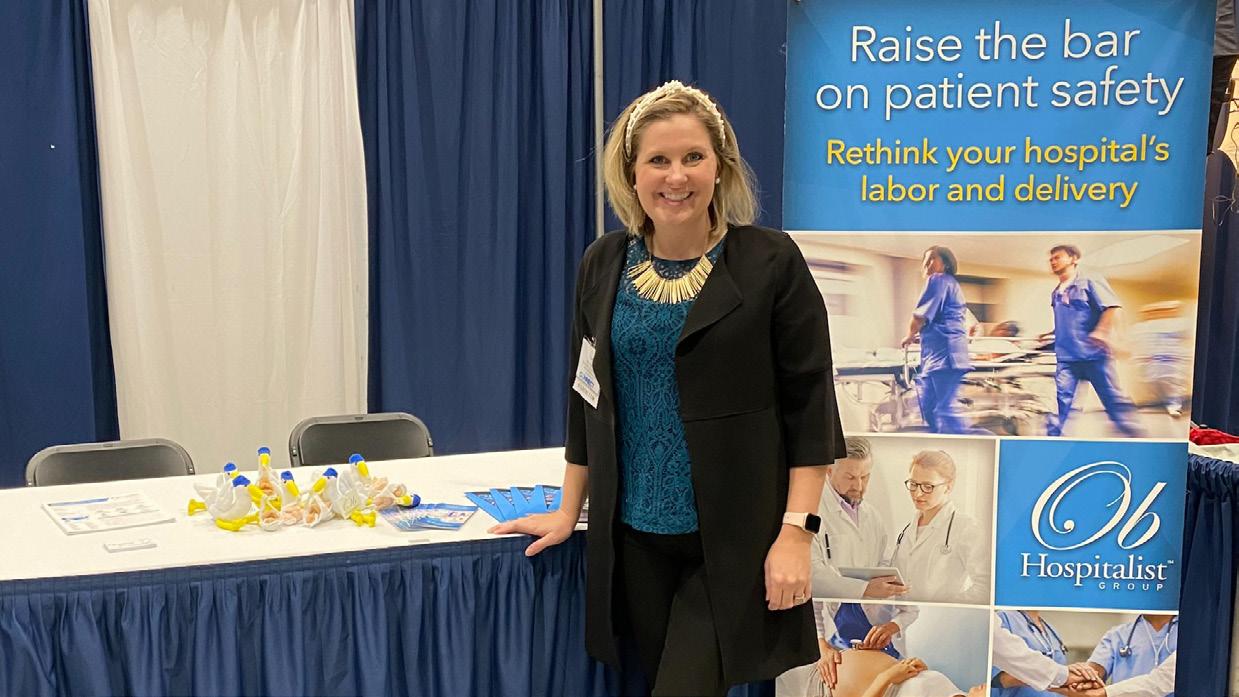
In 2021, OBHG received 32 partnership commitments from hospitals in 14 states ranging in size from 360 to 8,000 annual deliveries. Our largest growth came from Florida (five new commitments), Texas (four new commitments), and Louisiana (four new commitments). We are also excited for continued growth in New York, Ohio, and Illinois.
Our demonstrated success within our current network continues to drive expansion. In 2021, 40% of OBHG’s new hospital partner commitments came from hospitals with whom OBHG had existing partnerships with sister hospitals. This growth included four additional partnerships with CHRISTUS Health, where OBHG now partners with ten hospitals across Texas and Louisiana, as well as two new OB hospitalist programs with OBHG’s largest system partner, HCA Healthcare, bringing our total HCA program partnerships to 27 across ten states. We are also excited to have new partnerships with Advent Health, Adventist HealthCare, BJC, LifePoint, Northwell, and Ochsner.
12
Ninth year on Inc. 5000 list
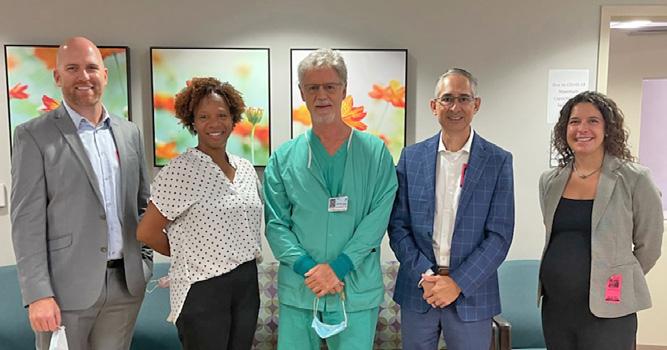
We were proud to have received recognition on the Inc. 5000 list for the ninth consecutive year as one of the fastest growing companies in the nation in 2021. To earn a spot on the list, companies must be U.S. based, privately held, forprofit and generate Inc.’s minimum revenue requirements to qualify. Only the top 1% of privately held companies are recognized each year. “This recognition is especially meaningful this year as our hospital clients have continued to consider us a trusted partner during the global pandemic,” said OBHG CEO Lenny Castiglione at the time of the Inc. 5000 announcement. “Our clinician’s unwavering commitment to patient care and our support team’s dedication to our clients has allowed OBHG to see significant growth even in an economic downturn and grow our customer loyalty and satisfaction scores.”
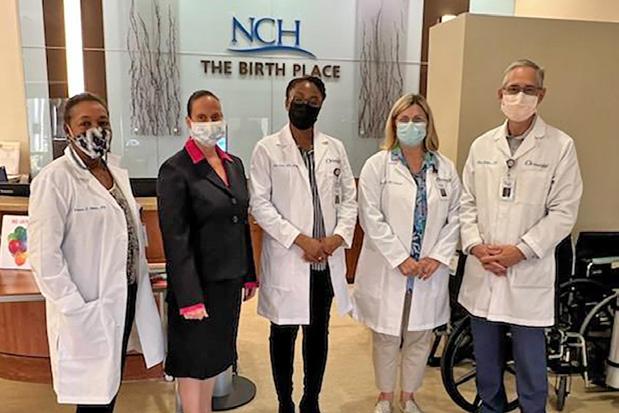
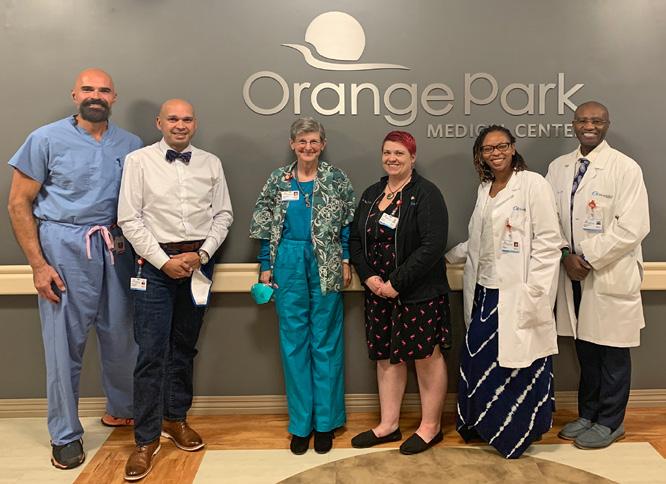
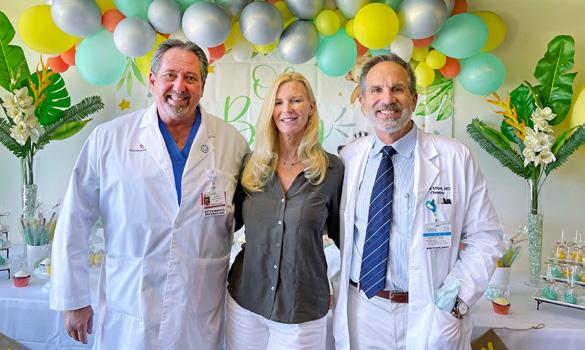
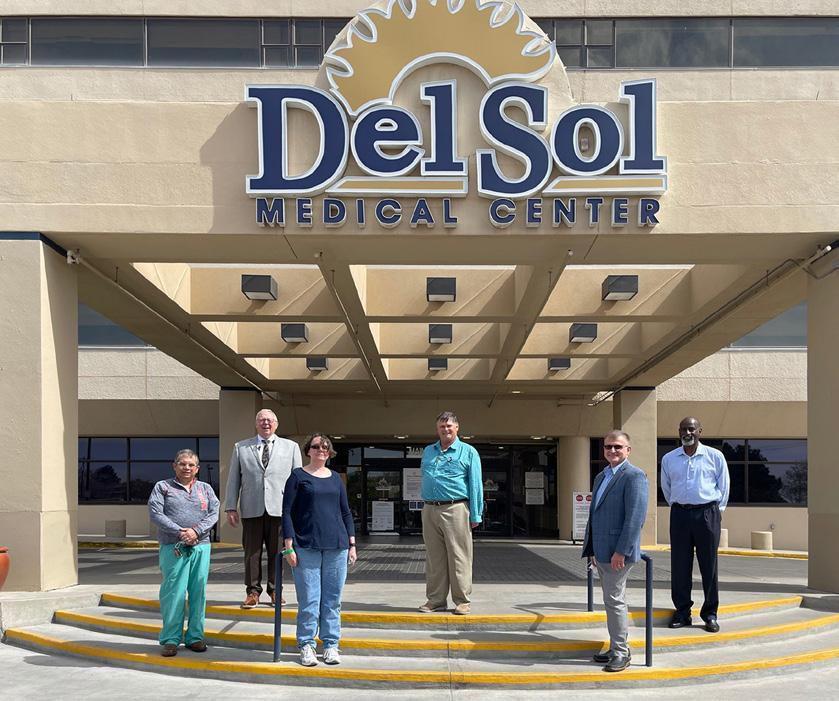
13
New services: Maternal Health Access Solutions
Last year, OBHG added nine new hospital partnerships with fewer than 1,000 annual deliveries. These hospitals, particularly those in more rural markets, have unique challenges that are not always addressed by a traditional OB hospitalist program with 24/7 on-site coverage. Based on discussions with these hospitals and other birthing hospitals across the country, OBHG launched its new suite of services to address these unique needs, OBHG’s Maternal Health Access Solutions
This initiative bridges gaps in care by bringing care to communities so that women don’t have to travel great distances for maternal care. After hearing from hospitals concerned about keeping their obstetrics unit staffed, our solutions are designed to help hospitals support their OB staff and ensure that maternal services can remain in the community.
OBHG’s Maternal Health Access Solutions offer customized alternatives to meet the needs of each individual hospital. Many of these options can be paired together.
For the teleMFM component of Maternal Health Access Solutions, last year, OBHG also announced a partnership with SOC TeleMed, the leading national provider of acute care telemedicine technology and solutions. This collaboration allows patients to have bedside care provided by an OB hospitalist while consulting with the MFM virtually, enabling more mothers to get the care they need within the convenience of their local community. This partnership brings together the telehealth expertise and infrastructure provided by SOC TeleMed with OBHG’s dedicated focus on maternity care and unconditional care for all pregnant women.
The benefits of having teleMFM have been a blessing for our patients, physicians and organization. The maternal-fetal medicine specialist is available within a matter of minutes if needed. The physicians are knowledgeable and personable, making the telemedicine encounter pleasant for the patient, family and staff. The collaboration between the OB hospitalists and the MFM physicians is amazing, with the OB hospitalists ready to provide care recommended by the MFMs. Our hometown maternal-fetal medicine physicians are loved and respected by our community, but in moments when they cannot physically be available at the bedside, the SOC Telemed physicians provide excellent care and seamless coverage.
14
Part-time physician coverage
Alternative clinician coverage
OB/GYN clinic coverage
TeleMFM/ TeleNICU OB telehealth
In-market call coverage
Powered by Ob Hospitalist GroupSM and SOC TelemedTM
— Michelle Owens, Nurse manager and maternal program manager, Hendrick Medical Center

“The privilege to help women through pregnancy and deal with whatever happens in the most compassionate and helpful way has been the foundation and joy of what I do.”
— Dr. Melissa Larsen, OBHG clinician
“My personal fulfillment comes from guiding a patient’s hospital course to a healthy and successful finish – be it a delivery or emergency GYN surgery. I have found that gaining a patient’s trust and engaging in frequent eye contact and conversation always lead to a strong finish. It makes what I do exciting and fresh every time.”
— Dr. Samira Tahtawi, OBHG clinician
We have really grown to love this team and don’t know what we did before this started.
— Texas OBHG hospital partner
Very pleased with OBHG and how quickly they were able to start up our program. The physicians and medical director are all very professional and welltrained individuals.
— California OBHG hospital partner
This program has been extremely valuable with recruiting and retaining experienced labor and delivery nurses. I am very pleased with the quality, responsiveness, care and compassion shown by each of the OBHG physicians. The needs of our patients in the women’s area along with the ED are addressed promptly and appropriately. This program has helped us provide higher quality care.
OBHG is a great team who supports providers, nurses and patients. They provide consistent care between the providers on the team and with the private providers. They are collaborative and committed to best care, support education to staff on the unit and in simulations and lead change on the unit for providers and nursing
— Colorado OBHG hospital partner
16
— Tennessee OBHG hospital partner
What our hospital partners have to say
Excellent program. Outstanding metric compliance. Great outcomes and patient experience scores.
— North Carolina OBHG hospital partner
The OBHG team have made a significant positive impact on our operations effectiveness. In addition, the OBHG Site Director participates in the steering and growth of the Women’s Center and is a valuable collaborator throughout other departments within the hospital, including surgical services and the emergency department.
— California OBHG hospital partner
The OBHG clinicians are outstanding practitioners. They go above and beyond to facilitate an environment of safety and optimizing patient outcomes by sharing current ACOG bulletins and practice changes with leadership and nursing.
— South Carolina OBHG hospital partner
I’m really pleased with the OBHG group. I can show using data that our safety metrics have improved. You guys have saved actual lives and I’m beyond grateful.
— Mississippi OBHG hospital partner
We are so happy with how this team has turned out. They are making great relationships with our community physicians.
— Texas OBHG hospital partner
The OBHG site director has been instrumental in the success of this program. She has built a highly collegial relationship with the nurses, anesthesia staff and community physicians. She is responsive, caring, compassionate and always puts the needs of patients as her priority.
— North Carolina OBHG hospital provider
17
OBHG clinicians deliver the future of OB


OBHG clinicians play a vital role in ensuring the success of our programs, leading efforts to build strong relationships with the hospital and medical staff and ensuring clinical quality. Their leadership is essential in ensuring patients receive quality care regardless of their personal circumstances.

OBHG’s National Clinical Leadership Meeting
We invest heavily in developing and supporting our clinical leaders. An important highlight of 2021 was bringing our site directors together for OBHG’s fourth annual National Clinical Leadership Meeting in October. After meeting virtually in 2020, our site directors were eager to gather again in person. Our 2021 meeting theme, Leading into the Future, highlighted the importance of our site directors’ leadership at the hospital and into the future as the industry evolves.
Over two days, participants engaged and connected with colleagues from across the country, with opportunities for learning and networking. The meeting launched with a special 15th anniversary in person message from OBHG’s founder, Dr. Chris Swain. Internationally recognized artist, TED speaker and author, Eric Wahl served as the keynote speaker for the event, inspiring the audience with his message of leadership in the 21st century. Workshop topics during the event included safety messaging, being a change agent, performance improvement and the role of the OB hospitalist as the maternal safety champion of the entire labor and delivery unit.
18
During our National Clinical Leadership Meeting, our clinicians were treated to a patient panel discussion led by Eleni Tsigas, CEO of the Preeclampsia Foundation.








19
Dr. Joy Anderson,
OBHG Site Director, Asante Rouge Medical Center
OBHG’s Clinical Leadership Awards
Every year, four exceptional site director honorees are selected for OBHG’s Clinical Leadership Award based on a combination of measurable program elements and intangible leadership qualities. Congratulations to our 2021 recipients for their standout efforts in exceeding quality standards and improving processes to help grow labor and delivery business.
Dr. Bernard Lynch,
OBHG Site Director, Methodist Children’s Hospital
OBHG Diplomat & Former Site Director, at Brookwood Baptist Medical Center
Dr. Teresa Marlino,
OBHG Site Director, St. Luke’s HospitalUpper Bucks campus
OBHG clinician awards and accomplishments
We’re proud to showcase just some of the many accomplishments of our 1,000+ clinicians. Congratulations to the following OBHG clinicians for awards they received or leadership roles they assumed in 2021:
• Dr. Mary Jackson was named Physician of the Year at Memorial Hermann The Woodlands Medical Center in The Woodlands, TX. Dr. Jackson’s nomination demonstrated her service as a role model of the medical center’s Partners in Caring Philosophy. Nominations for the award come from fellow colleagues, hospital staff, and leadership. The award signifies Dr. Jackson’s commitment to excellence.
• Dr. Dallas Thompson received The Birch Mission Award from The Providence Alaska Recognition and Retention Council in partnership with Providence Alaska Medical Center administration. Nominated by nursing leadership, Dr. Thompson exemplified dignity, excellence, and integrity through his extraordinary compassionate care.


• Dr. Charlie Jaynes was notified that he was a recipient of the ACOG Texas Levels of Maternal Care Verification Program Outstanding Surveyor Award for the 2018-2021 cycle. This award recognizes the top 15% of surveyors based on knowledge, reliability, documentation, interpersonal and communication skills, professionalism, teamwork and passion.
• Dr. Rakhi Dimino began serving as Editor-in-Chief of SOGH’s new Journal of OB/GYN Hospital Medicine. OBHG’s Dr. Jane van Dis and Dr. Amy VanBlaricom joined the journal’s editorial board.
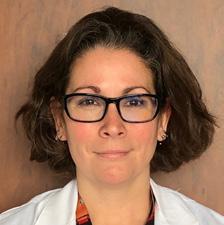
• Dr. Mark-Anthony Umobi was elected treasurer of ACOG’s District III Delaware section for the 2021-2023 term.
• Dr. Shannon Bailey was elected treasurer of ACOG’s District VIII Washington section for the 2021-2023 term.

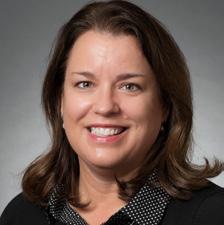
• Dr. Leticia Vargas was elected secretary/treasurer of ACOG’s District XI Texas section for the 2021-2023 term.
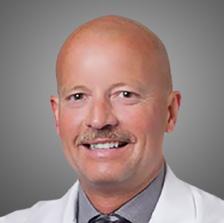
20
Dr. Craig Tilghman,
OBHG’s Clinical Leadership Academy
We are proud to offer a Leadership Academy for clinicians interested in further developing their leadership skills and potentially pursuing further leadership positions. The academy is limited to a small cohort of OBHG clinicians to allow for collegiate, group interaction. Participants are a mixture of both OBHG clinicians and OBHG Site Directors. In 2021, 21 clinicians successful graduated from the program, equipped with skills to be more strategic, open-minded, supportive to their teams and successful in a leadership post.


21
Supporting our hospital partners
COVID-19 continued to have a profound impact on our hospital partners in 2021. As the acute phase of the health crisis began to transition to a new normal, our OB hospitalist teams nationwide continued to closely support our hospital partners throughout variants and spikes in cases. Our clinicians also continued to leverage OBHG’s national network to share best practices and identify national trends about how COVID impacts pregnant women and newborns.
A 15-year history of customer-focused care
Throughout our 15-year history, OBHG has remained dedicated to delivering an exceptional customer experience. Our 94% customer retention rate at the end of 2021 is proof we are delivering on this dedication – despite a global pandemic.
In 2021, we announced OBHG’s industry-leading Net Promoter (NPS) score of 82, according to our annual client satisfaction survey. NPS is the global standard for measuring customer loyalty and satisfaction. A score of 70 or higher is considered by industry experts to be “world class” and an indicator of overwhelming customer loyalty.
Not only did OBHG’s NPS increase from 71 to 82 (a 15.5% increase in one year), but so did satisfaction metrics relating to program elements such as improved patient safety and 24/7 physician coverage.
In addition, 83% of OBHG’s clinical site directors received perfect or nearly perfect scores in the areas of professionalism, knowledge and responsiveness.
An industry-leading NPS of this magnitude is a strong reflection of our customer-centric culture and great recognition for our frontline clinicians and national support staff, who consistently go above and beyond to exceed our clients’ expectations. Especially when our operations and clinical leadership teams were unable to visit our hospital clients for much of the year due to challenges created by the pandemic, the results are a vote of confidence in our strength as an organization and confidence in our physicians’ capability to provide high quality, patient-centric care, no matter the circumstances.
— Lenny Castiglione, OBHG CEO
National efforts aimed at addressing maternal mortality and morbidity
As the world continued to navigate the ongoing pandemic in 2021, the U.S. maternal health crisis continued to loom. In 2021, several national efforts aimed at preventing deaths and complications tied to pregnancy were put in place.
When The Joint Commission began publicly reporting hospital performance on NTSV cesarean birth rates in 2021, it was right on the heels of the Department of Health and Human Services’ action plan to improve maternal health which including reducing NTSV C-section rates.
Also new in 2021, the American College of Obstetricians and Gynecologists (ACOG) and The Joint Commission announced a new collaborative initiative, the Maternal Levels of Care Verification program. The program, aimed at reducing maternal mortality and morbidity is guided by four levels of care, ranging from “basic” to “regional perinatal health care centers.” Level III and IV designations require an onsite OB/ GYN at all times, and also require an MFM, anesthesiologist, specialty and critical care physicians to be available 24/7.
OBHG is an active participant in addressing maternal mortality at our hospital partner sites – including reducing unnecessary C-sections and improving health around hypertension in pregnancy. As an organization focused on evidence-based practices, our initiatives are closely aligned with clinical quality goals outlined in the new efforts outlined above.
Not only are we continuing to launch new initiatives to lower C-section rates but we are helping our hospital prepare for maternal care designations. We have seen many examples within our partner hospitals where patient safety has improved as a result of implementing standardized protocols, and we remain dedicated in furthering efforts to improve care.
22
OBHG launches new measurement effort
In January 2021, we launched a new assessment tool sent to all OBHG site directors to evaluate their team’s engagement on the labor and delivery unit. The assessment, called HERAld, was kicked off as a measurement of specific behaviors that OB hospitalists demonstrate on the labor and delivery, postpartum and antepartum units and how these behaviors relate to the OB hospitalists’ success. The results showed that hospitals that “hard-wire” the involvement of OB hospitalists in patient care share common characteristics and have a pervasive culture of team-based care. These hospitals also better position OB hospitalists as the maternal safety champions of the entire delivery unit. We shared results of the assessment with our hospital and system partners and are using the findings to drive culture change at the hospital level. We are looking forward to tracking year-to-year change using this important measurement tool.
The OBHG program has significantly improved the outcomes at our facility. Their responsiveness and overall collaboration have been excellent. They challenge the status quo and are true partners in the care we provide to our community.

— Michigan OBHG hospital partner
Celebrating our partnerships

As our teams worked alongside our hospital partners in 2021, we had the privilege of recognizing some important partnership milestones. We celebrated three 10-year anniversaries and 11 five-year anniversaries of our programs. Our teams are so appreciative of the amazing OB physicians, nurses and hospital staff members that make our partnerships so successful.


23
OBHG in the news
Each year, OBHG’s clinicians and leaders appear in a variety of news stories and offer expert opinions to publications large and small throughout the United States. In 2021, our clinicians discussed topics ranging from COVID-19 and immunization to maternal health and pregnancy issues. Our experts also shared their insights on topics such as diabetes during pregnancy, the staffing crisis, racial and ethnic disparities, physician burnout, reducing C-sections and more.
These articles were published from an assortment of media outlets including Modern Healthcare, Eating Well, TIME, Romper, USA Today, The Hill, Health Leaders, Managed Healthcare Executive and Chief Healthcare Executive.

Highlighted media placements include:
ACOG Green Journal – Dr. Madeline Sutton
Racial and ethnic disparities in reproductive health service and outcomes

Op-Med – Dr. Joy Anderson
3 ways hospitals can prepare for major emergencies
USA Today – Dr. Alissa Erogbogbo
Babies born to moms with COVID-19 when pregnant should be watched for long-term impacts, researchers say
Community Impact News: Spring/Klein Edition - Dr. Rakhi Dimino
As vaccinations lag, experts say herd immunity may be unattainable
Fox 40 – Dr. Alissa Erogbogbo
OBGYN discusses getting COVID-19 vaccine while pregnant
The Hill – Dr. Mark Simon
As ICUs reach capacity, pregnant women must get vaccinated Physicians Practice – Dr. Garrick Slate

Shifting careers: the sky (or sometimes the airline route) is the limit Managed Healthcare Executive podcast – Lenny Castiglione, CEO Addressing care, costs, issues among OBGYNs
Romper Magazine – Dr. Alissa Erogbogbo
Is diabetes going to crush my dreams of the perfect pregnancy?
Fox 6 – Dr. Kaneez Ali
COVID shots for pregnant women urged, 31% fully vaccinated TIME – Dr. Denise Vilchez Cardenal
With little data to guide them, pregnant health care workers are stepping up to get vaccinated against COVID-19
LA Parent - Dr. Amy VanBlaricom
Reducing C-sections in California

STAT - Dr. Alissa Erogbogbo
Managed care’s role in protecting women from childbirth-related complications
25 News – Dr. Denise Vilchez Cardenal
OB-GYN supports CDC’s health advisory for pregnant women to get vaccinated
OBG Management – Dr. Hartaj Powell and Dr. Nicholas Kulbida Championing preventive care in ObGyn: a tool to evaluate for useful medical apps Health Leaders – Dr. Amy VanBlaricom
Effort to limit unnecessary C-sections making strides

24
Eating Well – Dr. Mark Simon
This is the best time for your family to get the flu shot
Modern Healthcare – Dr. Mark Simon Hospital staffing troubles, raging COVID-19 leave leaders eyeing service cuts

Physicians Practice – Dr. Rakhi Dimino
Combating a culture of perpetual burnout

STAT Podcast - Dr. Alissa Erogbogbo
An OB-GYN on the maternal mortality crisis in the U.S.
Telemundo 52 – Dr. Chasity Jennings–Nunez
Should pregnant women get vaccinated against COVID-19?

14 News – Dr. Michael Schultheis
Tri-state parents finally take home their ‘miracle’ baby
Student Doctor Network – Dr. Bernard Lynch
Why men should consider OB/GYN as a specialty
LinkedIn – Future of Obstetrics Industry Survey Report
A staffing crisis that could get worse

OwlGuru – Dr. Diana Glasser
OB Hospitalist – Diana Glasser, MD, FACOG
NBC-2 – Dr. Denise Vilchez Cardenal
Many unknowns about fertility and the COVID-19 vaccine
Managed Healthcare Executive – Dr. Mark Simon Policymakers must take action to ensure maternal health extends beyond the labor and delivery room
Beyond Type 1 – Dr. Alissa Erogbogbo
How one black mother with type 1 diabetes navigated her pregnancy

Chief Healthcare Executive – Heather Moore, VP of Risk Management, Quality and Compliance Healthy bottom line: maternity care and today’s risk environment
Physicians Practice – Dr. Nicholas Kulbida Bedside manner remains vital during pandemic
MedPage Today – Dr. Denise Vilchez Cardenal
Pregnant doctors are getting their COVID shots
Listen and subscribe to The Obstetrics Podcast

Stay informed about what’s going on in the obstetrics industry while getting your podcast fix. OBHG’s show, The Obstetrics Podcast, features topics aimed at OB/GYNs and healthcare leaders ranging from maternal health topics to how hospitals can better treat preeclampsia to why OB/GYN residents are choosing hospitalist medicine.
Subscribe on your favorite podcast directory or listen directly
25
My greatest satisfaction comes when I am able to serve a patient, maybe someone I have never met, in what may be their most frightening or perhaps darkest hour. Not everything in obstetrics goes as planned, so being there in a critical time of need, providing a sense of calm, a plan of action and hope for a good outcome is the most fulfilling thing for me. The most precious gift you can receive is the trust of another human being. It’s delicate and priceless.
— Dr. Jimmy Ellis, OBHG clinician
777 Lowndes Hill Road, Building 1 | Greenville, SC 29607 • 16945 Northchase Drive, Suite 2150 | Houston, TX 77060 Phone: 800.967.2289 | Fax 864.627.9920






















































